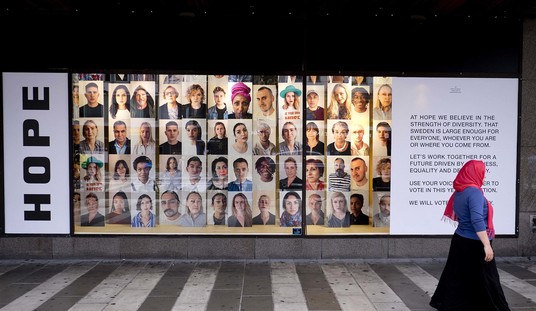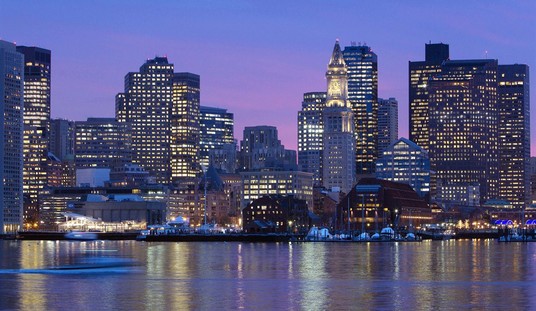Ed has written about the fall of Syria to rebels, and I share his happiness that Iran has suffered yet another blow in its plans to expand its influence in the Muslim world.
But as malign as Iran is and as evil as the Assad regime was, I am skeptical of any claims that the United States has a constructive role to play in pacifying the failed state.
I agree with the principle that a stable Middle East is in our interest, and might be persuaded that a modest investment in increased stability in the region could have a large payoff if a billion dollars bought peace--after all, we are spending much more than that just in air defense duties protecting Israel from outside attacks. Naval ships and missiles are very expensive, after all.
But let's face it--almost every intervention we have made in the region has been a disaster. The Abraham Accords--brokering peace between Israel and Arab countries has yielded results worth emulating, but every attempt at nation building in the Muslim world has made things worse, not better.
Here comes the democrat military-industrial complex to cause more death and make more money
— Steve A (@SteveV35B) December 8, 2024
How to Convince a Reluctant Trump to Get Involved in a Liberated Syria https://t.co/1hKQlctdhO via @politico
Yet the foreign policy elite is hungering to get involved and scheming to find ways to convince Trump to do so. Biden has already pledged to pour a billion dollars into Syria for some reason or another, almost as pouring money into failing states is more a reflex than a foreign policy.
INSANE: Joe Biden pledges to send aid to the new regime to rebuild Syria.pic.twitter.com/Xte9cSK3s8
— Proud Elephant 🇺🇸🦅 (@ProudElephantUS) December 9, 2024
The US has been playing around in Syria for years, and that hasn't worked out well for anybody involved. We rightly disdained the Syrian regime because the Assads were and are megalomaniac psychopaths. Still, somehow our foreign policy elite have ignored the fact that most of the coalition fighting against Assad are also megalomaniac psychopaths and anti-Western terrorists.
Read @simonmontefiore on After Assad:https://t.co/gJraHki6PW
— Bari Weiss (@bariweiss) December 9, 2024
It is difficult to overstate how evil the Assad regime was. This is a government that used chemical weapons against its own citizens and treated any dissenters with brutality rarely matched in modern history. It was allied with our adversaries and stood opposed to US policies at almost every turn.
I am hereby demanding that the US do NOT get involved in the conflict between Syria, Russia and Iran. This is not our fight, we should not send one penny to Damascus or any other party involved. We cannot let the warmongers in the White House succeed in starting World War 3! pic.twitter.com/9xWCHbTbGl
— Donald J. Trump - Parody (@realDonParody) December 7, 2024
But it was contained, for the most part. What will happen now?
Don't expect it to become warm and fuzzy, that's for sure.
The warlord Abu Mohammad al-Jolani—formerly of al-Qaeda, then al-Nusra, and now the leader of Hayat Tahrir al-Sham, known as HTS—now rules Damascus and much of Syria—but far from all. On Wednesday, his faction announced that “Muslims and Christians in all their diversity will be respected.” Whether this suggests a genuine wish, or whether this is simply the latest chameleon twist in al-Jolani’s long history of deception on the road to creating an Islamist state, has yet to be seen. (Of course, the Western media are easily manipulated by small details. Yesterday, CNN actually analyzed al-Jolani like this: “How Syria’s rebel leader went from radical jihadist to a blazer-wearing ‘revolutionary’.” Never has a blazer, or any sartorial triviality, assumed such geopolitical significance.)
It is also yet to be seen what al-Jolani—a terrorist who fought the Americans in Iraq and was imprisoned, for a time, at Abu Ghraib—has in mind for Syria. What we know is that for decades, the fate of Syria has been in the hands of ruthless faraway contenders, chiefly the Iranian tyrant Ayatollah Khamenei, Hezbollah secretary-general Hassan Nasrallah, and Russia’s president Vladimir Putin, whose airpower enabled Assad to survive. They long used the Syrian people as puppets in their anti-American, anti-Israeli resistance axis.
So the bad guys who were in charge of Syria are replaced by a bad guy who may be in charge of Syria for a while, although the "rebels" are not some cohesive group who will form a coalition government. They are many groups, and more likely to wind up fighting each other for power than consolidating behind one leader for long.
Syria may emerge as a single state, tolerant of all its many ethnic minorities—but that is very unlikely—or it may be further federalized into autonomous entities ruled by the Kurds, the Alawites, and a central sector under Sunni rule, hopefully not of repressive Islamists. Each will be protected by or dominated by outside powers, and this may just be the start of another round of civil war. Turkey already has its army in its own Turkish-occupied zone, plus its own Syria proxy militia in Syria, and it is unclear what relationship will develop with HTS. Israel may develop its own relationships with the Kurds and others. Russia, most likely, will depart—though the possibility of an enclave around Tartus could be delivered in agreement with the Turks. Al-Jolani will either try to remake himself as a Syrian leader for all sects, or stay true to the die-hard Islamism of his career, with disastrous results for all Syrians, but especially women.
Turkey and Israel will be the countries that do the most to shape the future of Syria. Trump will certainly get pulled into negotiations with them over Western policies aiming to tamp down regional chaos, but direct involvement in the internal conflicts in Syria would almost certainly be a losing proposition.
The delusion is that we can actually dictate the future of Syria. We can't. Perhaps with the application of force here or there to contain terrorists, we can protect ourselves and our allies, but the internal chaos stems from the fact that Syria is not a natural state, and the competing factions won't want to live together in peace.
It's true that the United States can't retreat fully and remain within our borders and ignore the rest of the world--our economy is too international to make autarky possible or wise--it's also true that we cannot and never have been able to dictate every outcome.
Trump is right to focus on protecting our interests, not trying to do the impossible. We cannot build every state, fix every problem, or oppose every bad guy.
America first isn't just the name of an ideology, and it doesn't mean ignoring the world outside our borders. What it means is focusing on our enduring interests and recognizing that we can't make the world a transnational utopia.







